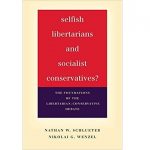If the United States is experiencing a version of the democratic self-destruction of ancient Athens that was recounted by Thucydides, diagnosed by Plato, and studied by the American founders, then there is plenty of blame to go around—but we can’t blame Carson Holloway. His new book provides us with resources to understand how far we have fallen and what kind of thinking we must recover if we are ever to restore some constitutional, self-governing dignity.
Holloway’s brilliant study of the fundamental political-constitutional debates of the first presidential administration, Hamilton versus Jefferson in the Washington Administration, is a model of serious political science. It is also a tutorial on the deep roots of our continuing political contests over liberty, equality, concentration of government power, and the authority of constitutional principle to guide policy. In American historiography, the focus on the contest between Hamiltonian and Jeffersonian conceptions of our political order has waxed and waned across the centuries. Holloway shows why this contest of fundamental views should remain central to our political education, and why their contending ideals will probably remain central to our political contests, whether we recognize them or not.
This is not as entertaining an encounter with the founding era as the blockbuster Broadway musical Hamilton, but Holloway’s book is delightful in its own way. Nor is it just filial piety toward the Founding Fathers. Instead, it shows proper respect for their extraordinary achievements by setting up a Socratic debate between the principled views of Hamilton and Jefferson. The book reads as a contest not about petty politics or personalities but about what Holloway calls contending views of “regime principles.”
Betraying or Completing the Founding?
Start your day with Public Discourse
Sign up and get our daily essays sent straight to your inbox.The two leading cabinet members of Washington’s administration had become, by the close of his first term, bitter political rivals who went on to found the republic’s first political parties, which each designed to thwart the aims of the other. The Democratic-Republican Party, which was launched by Jefferson, is more or less the Democratic Party of today. The Federalist Party, launched by Hamilton, is in some ways the progenitor of the Republican Party.
Although they were not mentioned in the Constitution, political parties arose because shared first principles did not always yield the same views about how to implement those principles. This higher kind of party identity and argument is what we largely have lost; instead we have amplified the lower kind of partisanship from the underside of the 1790s—hyperbolic rhetoric, righteous denunciation of the opposing view as heretical and out to destroy the political order, and attempts to personally destroy one’s opponents.
The volume’s subtitle poses the guiding question about the contest of ideas and policies between the two figures and parties: was each side betraying or completing the founding? Hamilton and Jefferson each considered himself true to the original meaning and intent of the Constitution, and each accused the other of betrayal. The bitterness between them paradoxically arose because of their shared commitment to the bedrock ideas of the constitutional order found in the Declaration of Independence and the 1787 Constitution.
The Writings of the Founders
Along with Washington and Madison, both Jefferson and Hamilton believed that interpreting and implementing our country’s foundational texts required careful written exposition. The result is the extraordinary state papers produced by Hamilton and Jefferson (and by Madison as Jefferson’s lieutenant) during the Washington administration. As requested by congress, Secretary of the Treasury Hamilton produced a series of reports that established the political economy of an American nation state. These reports were written on the public credit (addressing our massive national debt), on the national bank, and on manufactures. As requested by Washington, he also wrote opinions on other crucial policies, such as the French treaties and American neutrality amid the brewing European wars.
These reports were incredible labors, offering political and economic analysis of the highest order. To cite but one example, Hamilton took so seriously the question of defaulting on the national debt, and principles for how to repay it while developing a sound long-term scheme of public debt and credit, that he wrote to the Rev. John Witherspoon (President of Princeton) for advice.
Jefferson (and Madison) responded in writing to the reports, and Jefferson simultaneously wrote opinions on domestic and foreign policy matters at Washington’s request. Hamilton argued (and Washington largely agreed) that America rightly could establish energetic but limited government, with strong national or federal policies on economic growth, national power, and respectable self-defense. Jefferson and Madison were alarmed that this would mean loss of liberty in the states, the erasing of federalism and the rise of centralism, and the establishment of a mercantile oligarchy that would dominate politics and the economy. (Holloway does not mention that Jefferson, as one of the largest slaveholders in Virginia, probably also was concerned to retain Southern autonomy so as to protect their peculiar institution. This became Jefferson’s explicit view by the time of the Missouri Compromise debates over two decades later.)
Holloway recounts that party newspaper and periodical essays also played a role in this constitutional debate over regime principles and policies. Hamilton produced extraordinary arguments in this category as well, including his pseudonymous writings in The Vindication series of 1792 and as Pacificus regarding presidential power and American foreign policy. Jefferson, in contrast, preferred to direct others to write the more inflammatory and partisan essays that appeared in newspapers attacking the Washington administration through the guise of attacking Hamilton—and eventually the Federalist Party—as monarchist, hostile to popular government, hostile to state and local liberty, and oligarchical in seeking to enrich itself while ruling the people.
Today, we are left mostly with this category of debate and often in lower, briefer, less enlightening and more partisan forms. We have access to much less writing by high-ranking public servants, let alone anything approaching the caliber of the reports and opinions of the leading founders.
The basic approach of Holloway’s book is to carefully examine the arguments and context for each of the state papers and major periodical essays of these contending statesmen; to arrange them in sequence as a debate (effectively recreating the political dialogue of the 1790s); to convey Washington’s final judgment on the opposing views and his ultimate policy decision; and only then to offer his own judgment about the strengths and weaknesses of the writings and contestants. The book concludes with several lessons that the diligent reader could take from careful review of these fundamental views about the principles and character of American politics. Holloway undertakes all of this with judiciousness, fairness, and respect. It is an extraordinary accomplishment, offering both a valuable scholarly resource and a political education in statesmanship and civic debate.
Holloway candidly states that he judges the views of Hamilton—and of Washington, who mostly agreed with Hamilton—as more congruent with the Constitution’s plan for implementing the principles of the Declaration, and that they represent a better approach to American foreign policy. Even so, this book provides the most thorough, fair, and considered account of the history and content of these ideas that I have encountered. Indeed, I can recall no such reconstruction of the main events and controversies coupled with such careful examination of the major documents and unfolding debates.
Lessons for Election 2016
The debates across Washington’s two presidential terms began with economic policy and questions of federalism or the balance of power between the state and federal governments. By the second term, foreign policy and the scope of executive power take center stage, but the domestic disputes remain.
Ever heard of concern about a massive national debt and the possibility of default, or of debates about what policies would best address those problems while protecting our important national principles? How about charges that material inequality is rising, that an oligarchy of bankers and businessman is hijacking politics and harming the common good? What of charges that the national government is usurping power in violation of the Constitution, robbing state and local governments of their rightful liberty—and that executive power has run amok in foreign and military policy, disregarding the views of the people and the people’s elected representatives in Congress? This book offers 300 pages of careful analysis on these and other important and complex issues.
One of Holloway’s important observations is a measured assessment that Jefferson and Madison eventually accepted, after the deaths of Washington (1799) and Hamilton (1804), many of the views of federal and presidential power that they once had excoriated as gutting the Constitution. The disastrous War of 1812 jolted the Democrats out of their views about weak federal power and the need for only occasional bursts of presidential initiative (which Jefferson had employed in his two terms, while Madison was more restrained and passive as chief executive). Watching your national capital be invaded and burned (in 1814) because you have no national army or navy, little taxation, and no national bank to quickly raise funds for national defense—all of which signals to adversaries that you have no national strength to back up your diplomacy or protests about grievances—apparently was sobering. Jefferson and Madison also implemented some of the Washington-Hamilton policies for developing a manufacturing base.
Holloway wisely and helpfully concludes with several lessons we can draw from the founding debates. He does not offer easy solutions or simple slogans, but he does provide intellectual resources, training, and maxims for the perennial challenges of self-government. Among these are the importance and value of grounding policy debates in a clear and deep understanding of first principles. True statesmanship requires reasonable judgment about how we can live up to and protect first principles amid changing circumstances and contending views. Holloway’s book teaches not only the deep principles of American political thought but also the paradox that our founding is a complex alloy: a clear set of principles has been combined from the start with debates about how to implement those shared principles. We see the dark side inherent in high, principled debate: that we can fall into righteous indignation, declaring our opponents heretics or dangers to the public good.
In the end, this deep study of Hamilton versus Jefferson produces the highest regard for the statesman who invited both to serve the project of launching a new constitutional order and government, who tried to mediate their disputes and keep them on a higher plane, and who sought to keep them both in his cabinet for as long as possible. In his prudence and moderation, Washington was superior to many men who were more learned in books and theories. Because, as Holloway notes, America’s political project always requires “an intelligent effort to reconcile diverse political goods that do not fit together unproblematically,” we need moderation and sound practical judgment as well as learned and high-minded discourse to pull us up from populism, low partisanship, and angry passions.
Given our political plight in election 2016, no wise person would forswear praying for the republic; but we should not only fret and whine, we should act—and as Lincoln said amid a much greater crisis, we first should study carefully so we can discern how to better exemplify our higher principles. Carson Holloway offers us a great resource.













